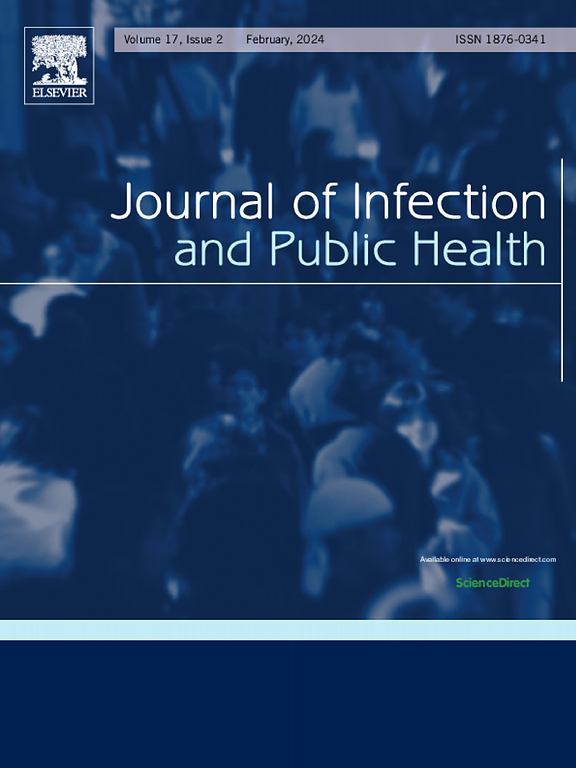COVID-19 后患慢性疲劳综合征的风险:3227281名患者的回顾性队列研究
IF 4
3区 医学
Q1 INFECTIOUS DISEASES
引用次数: 0
摘要
背景许多从 COVID-19 中康复的患者仍然患有慢性疲劳综合征(CFS)。据观察,有合并症的患者更容易患上 CFS。本研究调查了 COVID-19 后 CFS 的风险,以帮助医护人员降低 CFS 的风险。方法根据 TriNetX 提供的电子健康记录进行回顾性队列研究,调查 COVID-19 后 CFS 的风险。研究分析了年龄、性别、种族、疫苗接种和 COVID-19 严重程度等因素。采用倾向得分匹配法来平衡 COVID-19 和非 COVID-19 组群。结果这项研究涉及2020年1月1日至2023年12月31日期间的3227281名COVID-19患者和3227281名非COVID-19患者。与非COVID-19组相比,COVID-19组在1次随访间隔中的CFS发病率更高(HR 1.59,95 % CI = 1.54-1.63)。亚组分析显示,不同年龄组(18 岁)、性别、种族和合并症的 CFS 风险均有显著差异。在 18 岁及以上的成年人中,患病风险的增加尤为明显。本文章由计算机程序翻译,如有差异,请以英文原文为准。
Risk of chronic fatigue syndrome after COVID-19: A retrospective cohort study of 3227281 patients
Background
Many patients who recovered from COVID-19 still suffer from chronic fatigue syndrome (CFS). It was observed that patients with comorbidities were more prone to developing CFS. This research investigates the risk of post-COVID-19 CFS to assist healthcare professionals in reducing the risk of CFS.
Methods
A retrospective cohort study is conducted to investigate the risk of post-COVID-19 CFS based on the TriNetX-sourced electronic health records. Factors including age, sex, race, vaccination, and severity of COVID-19 are analysed. Propensity score matching was applied to balance COVID-19 and non-COVID-19 cohorts. Kaplan-Meier analysis and Cox proportional hazard model were used to perform the relationship between COVID-19 and CFS risk.
Results
This research involved 3227281 patients with COVID-19 and 3227281 with non-COVID-19 between 1st January 2020 and 31st December 2023. The incidence of CFS was higher in the COVID-19 group compared to the non-COVID-19 group at 1 follow-up intervals (HR 1.59, 95 % CI = 1.54–1.63). Subgroup analysis revealed increased CFS risk across different age groups (>18), sexes, races, and comorbid conditions, with notable variations.
Conclusions
COVID-19 patients have a higher risk of developing CFS compared to individuals without COVID-19. The increased risk is particularly significant in adults aged 18 years and older.
求助全文
通过发布文献求助,成功后即可免费获取论文全文。
去求助
来源期刊

Journal of Infection and Public Health
PUBLIC, ENVIRONMENTAL & OCCUPATIONAL HEALTH -INFECTIOUS DISEASES
CiteScore
13.10
自引率
1.50%
发文量
203
审稿时长
96 days
期刊介绍:
The Journal of Infection and Public Health, first official journal of the Saudi Arabian Ministry of National Guard Health Affairs, King Saud Bin Abdulaziz University for Health Sciences and the Saudi Association for Public Health, aims to be the foremost scientific, peer-reviewed journal encompassing infection prevention and control, microbiology, infectious diseases, public health and the application of healthcare epidemiology to the evaluation of health outcomes. The point of view of the journal is that infection and public health are closely intertwined and that advances in one area will have positive consequences on the other.
The journal will be useful to all health professionals who are partners in the management of patients with communicable diseases, keeping them up to date. The journal is proud to have an international and diverse editorial board that will assist and facilitate the publication of articles that reflect a global view on infection control and public health, as well as emphasizing our focus on supporting the needs of public health practitioners.
It is our aim to improve healthcare by reducing risk of infection and related adverse outcomes by critical review, selection, and dissemination of new and relevant information in the field of infection control, public health and infectious diseases in all healthcare settings and the community.
 求助内容:
求助内容: 应助结果提醒方式:
应助结果提醒方式:


